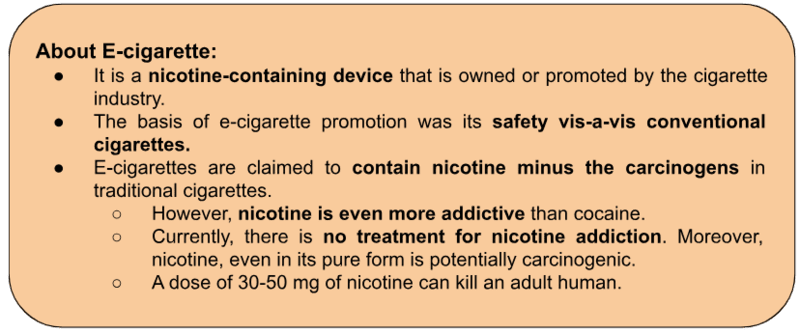GS Paper II
News Excerpt:
According to the World Health Organisation, E-cigarettes as consumer products have not been proven to be helpful at the population level for stopping tobacco usage. Instead, alarming evidence of negative population health implications has surfaced.

Concerns regarding e-cigarettes:
- As per WHO, young people who use e-cigarettes are almost three times more likely to use cigarettes later in life.
- E-cigarettes with nicotine are highly addictive and are harmful to health.
- It has been established that they generate toxic substances, some of which are known to cause cancer and some that increase the risk of heart and lung disorders.
- The use of e-cigarettes can also affect brain development and lead to learning disorders for young people.
- Fetal exposure to e-cigarettes can adversely affect the development of the fetus in pregnant women.
- Exposure to emissions from e-cigarettes poses risks to bystanders.
Global regulations regarding e-cigarettes:
- Thirty-four countries have banned the sale of e-cigarettes, 88 countries have no minimum age at which e-cigarettes can be bought, and 74 countries have no regulations for these harmful products.
- In India, the possession of e-cigarettes and similar devices is a violation of the Prohibition of Electronic Cigarette Act (PECA) 2019.
- According to data, 13–15-year-old children are using e-cigarettes at rates higher than adults in all WHO regions.
- In Canada, the rates of e-cigarette use among 16–19-year-olds have doubled between 2017 and 2022.
- In the United Kingdom, the number of young users has tripled in the past three years.
Government Initiatives to regulate e-cigarettes in India:
- Prohibition of Electronic Cigarette Act (PECA) 2019:
-
- It is designed to prohibit all aspects of e-cigarette products comprehensively.
- This includes production, manufacturing, import, export, transport, sale, distribution, storage, and advertisement of e-cigarettes.
- Cigarettes or Other Tobacco Products (Prohibition of Advertisement and Regulation of Trade and Commerce, Production, Supply and Distribution) Act, 2003 or COTPA:
- It was enacted in 2003 to prohibit tobacco business advertisement and regulation in India.
- The Act put restrictions on tobacco products, including cigarettes, gutka, pan masala (containing tobacco), cigars, cheroot, Beedi, Snuff, chewing tobacco, hookah, and tooth powder containing tobacco.
Way forward:
- As per WHO, immediate actions are required to prevent e-cigarette use and combat nicotine addiction, in addition to a comprehensive approach to tobacco control, and light of national conditions.
- There is no conclusive evidence that e-cigarettes prove beneficial in quitting cigarettes.
- Implementing higher excise taxes on all tobacco and e-cigarette products, so that it is not as cheap as a school lunch.
- Requiring large and pictorial health warnings on packages of these products to effectively inform the consequences of using these products, and make the package unappealing to youth.


